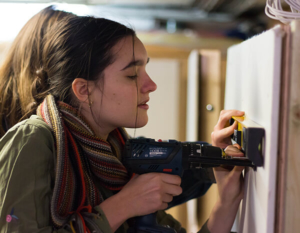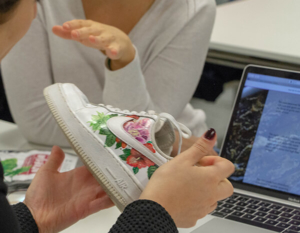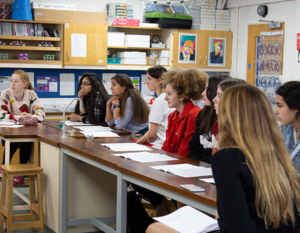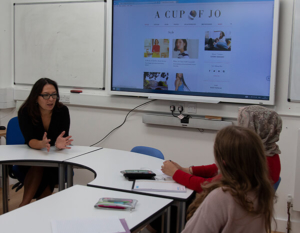Sixth Form Enrichment
You might also like...
The Sixth Form Enrichment Programme is in keeping with Francis Holland’s vision of offering a well-rounded education which goes beyond the narrow confines of exam specifications.
As well as weekly enrichment electives where students choose from a wide range of options, all Sixth Formers attend weekly Speaker programme lectures: a small group of prefects research and invite speakers from a wide range of academic, business and charity backgrounds: recent guests have included explorer Charlie Walker and novelist Dame Rose Tremain.
Sixth Form students are also offered termly Enrichment Elective courses, which are taught for a double period each week. These range from Forensic Psychology and Ancient Greek to Writing for Stage and Screen or Film-Making, creating films about science for our partner school in Tanzania. They also have the opportunity to participate in an innovation sprint as part of the creative enterprise elective, in which they learn to generate and develop business ideas. In the Summer term, all Lower Sixth students switch to Higher Education electives, tailored to their requirements whether they are taking a gap year, or pursuing a UK or international course of study. Specialist support is offered to students pursuing Oxbridge or medical school applications including interview preparation. We are also pleased to assist students who wish to pursue a degree apprenticeship.
In addition, we regularly host visits from US, Canadian and European university admissions teams and hold a series of ‘Working Lunches’ every year, where speakers from different career paths talk to interested students about their roles. This year we have been pleased to host the Deputy Head of Mission from the Irish Embassy, an FT business analyst, a corporate lawyer and a sustainable clothing company, among many others.
 Learn practical DIY and decorating skills with our experienced Facilities Team. Some of the skills covered are – basic hand tools and how to select the correct tool for the job; the safe and correct use of power tools; how to hang a picture and put up shelves; selecting the right fixtures and fitting (Eg. screws, rawlplugs etc); basic plumbing (Eg. dripping taps and unblocking sinks); basic electrics: changing a plug and replacing the fuse, re-setting a breaker in a fuse board and selecting the correct lightbulb; basic decoration: using Polyfilla, preparing and carrying out re-decoration; building a piece of IKEA flat-packed furniture and repairing a bicycle tyre.
Learn practical DIY and decorating skills with our experienced Facilities Team. Some of the skills covered are – basic hand tools and how to select the correct tool for the job; the safe and correct use of power tools; how to hang a picture and put up shelves; selecting the right fixtures and fitting (Eg. screws, rawlplugs etc); basic plumbing (Eg. dripping taps and unblocking sinks); basic electrics: changing a plug and replacing the fuse, re-setting a breaker in a fuse board and selecting the correct lightbulb; basic decoration: using Polyfilla, preparing and carrying out re-decoration; building a piece of IKEA flat-packed furniture and repairing a bicycle tyre.
 Have you ever come up with a good business idea and wondered how you might develop it? During this elective, students will get the chance to work with our link entrepreneur and business mentors who will guide them through an innovation sprint involving design-thinking and value propositions. The students will be expected to carry out a ‘dig deep’ research task relating to their concept and will present their research in a pitch to the group. This enrichment elective is designed to give the girls a real flavour of the world of work, particularly entrepreneurship.
Have you ever come up with a good business idea and wondered how you might develop it? During this elective, students will get the chance to work with our link entrepreneur and business mentors who will guide them through an innovation sprint involving design-thinking and value propositions. The students will be expected to carry out a ‘dig deep’ research task relating to their concept and will present their research in a pitch to the group. This enrichment elective is designed to give the girls a real flavour of the world of work, particularly entrepreneurship.
This course is for coders and the coding-curious! We will try to engineer a web app using the same tools employed by Instagram, Spotify and Pinterest. We will explore how to generate an idea, create a design, collaborate on code, test code and deploy on a web server. Along the way we will learn some Python and the widely used Django framework, design an interface using HTML, CSS and the Bootstrap framework, and collaborate on code using the GitHub source code management platform. No coding experience or knowledge is required, but everyone signing up will be expected to try to learn the ropes using the rich selection of online resources.
 It is inevitable that some medical issues will be relevant at some point in our lives. Often the time when we need to make an informed judgement is exactly the time when we are at our most vulnerable and it is good to have thought about these in advance. Subjects previously covered include Alzheimer’s disease, screening programmes, immunization, alcohol, hypertension, Parkinson ’s disease, sepsis, the NHS, cancer and thalidomide but the list varies depending on individual interests. Whilst this course is likely to be of particular interest to anyone considering pursuing a medicine-related degree (and many of the topics discussed will be useful as potential interview discussion points), there is no need for any specialist scientific knowledge.
It is inevitable that some medical issues will be relevant at some point in our lives. Often the time when we need to make an informed judgement is exactly the time when we are at our most vulnerable and it is good to have thought about these in advance. Subjects previously covered include Alzheimer’s disease, screening programmes, immunization, alcohol, hypertension, Parkinson ’s disease, sepsis, the NHS, cancer and thalidomide but the list varies depending on individual interests. Whilst this course is likely to be of particular interest to anyone considering pursuing a medicine-related degree (and many of the topics discussed will be useful as potential interview discussion points), there is no need for any specialist scientific knowledge.
 The creative writing enrichment course is a lively, interactive session of book discussions, reading reflections, and writing sessions led by an FHS English teacher who is a published author and ran the Literary Club at NYU in London for seven years. Looking at extracts based on life and literature’s biggest themes, students will journey into their own minds to articulate and express their feelings about these topics and explore the mystical and surprising process of writing. Creative writing fosters and enhances well-being and empathy, ideas of identity and self, creative thinking, originality and the imagination. Recent themes include love, death, identity, the individual and society, coming of age, freedom, and discovery.
The creative writing enrichment course is a lively, interactive session of book discussions, reading reflections, and writing sessions led by an FHS English teacher who is a published author and ran the Literary Club at NYU in London for seven years. Looking at extracts based on life and literature’s biggest themes, students will journey into their own minds to articulate and express their feelings about these topics and explore the mystical and surprising process of writing. Creative writing fosters and enhances well-being and empathy, ideas of identity and self, creative thinking, originality and the imagination. Recent themes include love, death, identity, the individual and society, coming of age, freedom, and discovery.
Discover the weird and wacky world of European film! This course will trace the invention of black-and-white silent film and its rapid development into modern-day cinema. Pupils are introduced to masterpieces by the likes of Pedro Almodóvar, Jean-Pierre Jeunet (a personal favourite) and dozens of new and exciting names. This elective is perfect for Sixth Formers fascinated by film or yearning for Europe! All films will have subtitles, bien sûr.
Is there a difference between a mainstream religion and a cult? Founder of Scientology L. Ron Hubbard was reported to have said “If you want to get rich, you start a religion.” In this elective, students are invited to explore the sociological and psychological roots of cultic religious movements throughout history. We will debate the morality of cults and the portrayal of such movements and their members in the media. Football teams, Extinction Rebellion, The Oprah Winfrey Show – to what extent do these modern-day phenomena share the characteristics of cults? This elective should be considered with caution as some sensitive topics are covered.
For weddings, a funeral, a party, a ceremony and most other events when humans come together, there will be music. Why is music such a prevalent part of our culture? We will be understanding the power of music, exploring the link between music and wider society. How is music influenced by and how does it influence social norms, the political economy, media industries and technological developments? We know music has extensively been used a positive tool and, therefore, what power does music have when used for evil? We will be looking at the history of music-making and listening and how conventions adapt over time and across cultures. We will look to research to gain an understanding of the social functions, and significance, of music in our lives, while listening to plenty of great music, old and new, on the way.
Have you ever gone into a bespoke bakery and thought what a wonderful gift personalised biscuits or cupcakes would be for someone important? This is an opportunity for students to let their creativity run free. On this course Sixth Formers learn a variety of techniques such as fine tip piping, making sugar paste flowers and transferring a personalised message/design which will result in beautiful cupcakes to present as gifts to rival the likes of Peggy Porschen and Biscuiteers!
What does it mean to say that ‘Black Lives Matter’? Who are TERFs? What is ‘Extinction Rebellion’ and what do they want? In this course we look at some of the issues at the heart of today’s progressive political movements and the debates they raise both within the movements themselves and in wider society. We will unpack the genealogy of these issues, understanding present concerns by looking at past battles, and take a look at the progressive movements from which our current political landscape has emerged. We will ask what is at stake in these debates to try to understand why they elicit such strength of feeling on both sides of the argument. Drawing on philosophy, politics, history & critical theory, this course will challenge our thoughts on progressive politics. It does not promise answers but it will help pupils to understand the issues which are shaping today’s most important social and progressive movements, and help them get behind the headlines and social media.
Spend the term exploring creativity at The Fashion School. Learn to drape, machine and hand sew, thrift and flip customisation, even how to repair clothes in the first four weeks before embarking on personal projects. Prom dresses, revamped denim and trainers, mannequin stands, designer donated fabric, glue guns, corset making, haberdashery, sweat-shirting – the possibilities and supporting facilities are all there at an arty fashion studio just off the Kings Road. Students are closely supported through their journey by Central St Martin fashion tutors as they unleash individual style and learn lifelong sewing skills.
As the world emerges from the havoc of Covid, there’s been much talk of not just recovery, but Building Back Better. Many see this moment as a unique opportunity to review and improve the system in which we live and work. Because let’s face it: the system wasn’t – isn’t – working. Crises loom all around us: climate breakdown; biodiversity loss; dysfunctional politics; gross inequality; a sense that our increasingly virtual lives are alienating us from the natural world and from each other…
So there’s an urgent need for new ideas: radical, imaginative solutions to society’s problems. So what if the working week was four days? What if all citizens were paid a basic income? What if cities were car-free? What if there were no exams? And what if I told you that all these utopian ideas are already being tried out somewhere in the world?
This term, we’ll be exploring these and other Ideas to Save the World – and trying to come up with one or two of our own. Because to save the world, first you have to imagine it saved.
Can we solve the climate crisis? Why are we finding it so hard to do so? Is it up to individuals and consumer choices? Will technology save us from disaster? What is at stake if we don’t achieve 2 degrees of warming? In this course pupils will learn about the sustainability challenges of the modern world and hopefully make a positive contribution to society. Students will investigate the positive contributions that can be made on a local, national and global scale to create a happy and fulfilling sustainable future for everyone.
Because we live in a multi-lingual, multi-cultural environment, the concept of identity keeps evolving. Are we defined by our nationality, cultural background, the language we speak? In this elective, we will explore what constitutes cultural identity from a theoretical approach to real life situations. This elective will cover the notions of ‘diversity,’ ‘inclusion,’ ‘cultural appropriation’ and the relation between identity and violence (work by Amin Maalouf) while trying to sustain cultural identity of individual/s. This elective will appeal to those who like reading and discussing questions of identity but also those who enjoy tackling and potentially solving challenging situations that involve diverse cultural identities.
Students will be given a hypothetical portfolio of £1,000,000 and learn how to invest it. Along the way, they will learn why house prices go up (or down), whether they should buy gilts or corporate bonds and why they need to understand the yield curve. Students will look at long term performance of equities, work out whether to buy gold or other metals, and weigh up the financial and ethical questions around investing in commodities such as cocoa. They will consider whether they would like to prioritise income over capital gains and learn how to minimise your tax burden. Students will think about savings and the merits of holding some cash. In short, pupils will be ready to challenge the Warren Buffets of this world – or at the very least avoid being confused or misled by any ‘get rich quick’ investment promises in the future.
How do cities and suburbs, fields and forests appear when viewed from a vantage point of nearly twenty miles above Earth’s surface? Would you like to picture the pitch black of the universe and visualize the Earth as a globe surrounded by its fragile blue atmosphere? What experiments would you do if you had a laboratory on the edge of space?
High altitude balloon (HAB) missions can achieve breath-taking views of our planet and are designed to carry out experiments in near-space conditions to gather a multitude of scientific data for analysis. Such large helium-filled balloons are released at ground level with payloads attached, climbing to an altitude of around 30 km, above 99.9% of Earth’s atmosphere. The balloon bursts and the payload will be returned to Earth, via parachute. Recovery of the probe is possible using GPS tracking. Sixth Form students can be part of an inventive FHS design and build team to achieve all of this without NASA’s help!
This project will provide pupils with an opportunity to complete research, problem solve and develop skills in the following areas:
- Atmospheric Physics and meteorology, to make flight path prediction
- Telemetry and data logger evaluation
- Power and battery issues
- Design experiments to detect cosmic rays, CO2 or ozone
- Complete exposure experiments with rubber bands, seeds or mould
Latest School News








